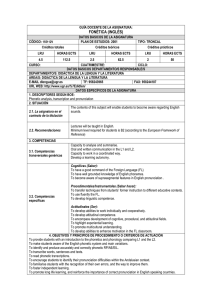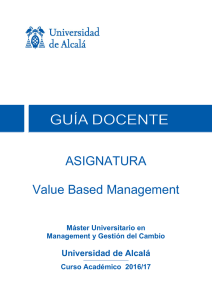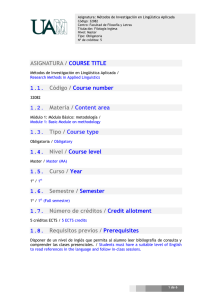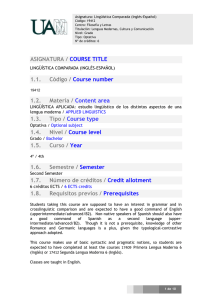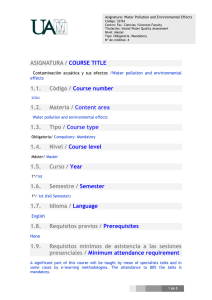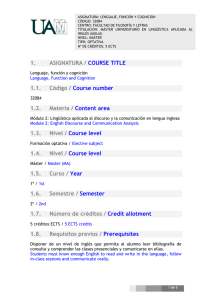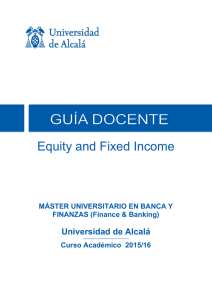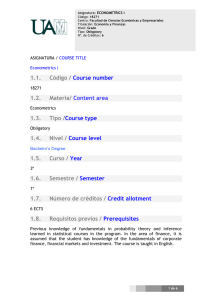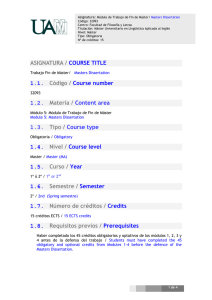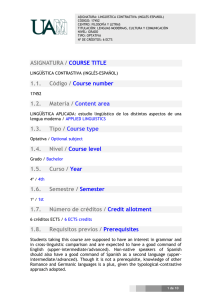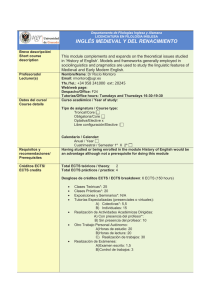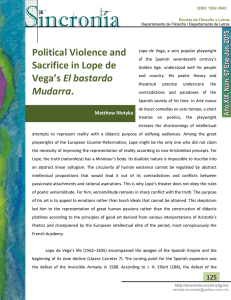ASIGNATURA / COURSE TITLE 1.1. Código / Course number 1.2
Anuncio
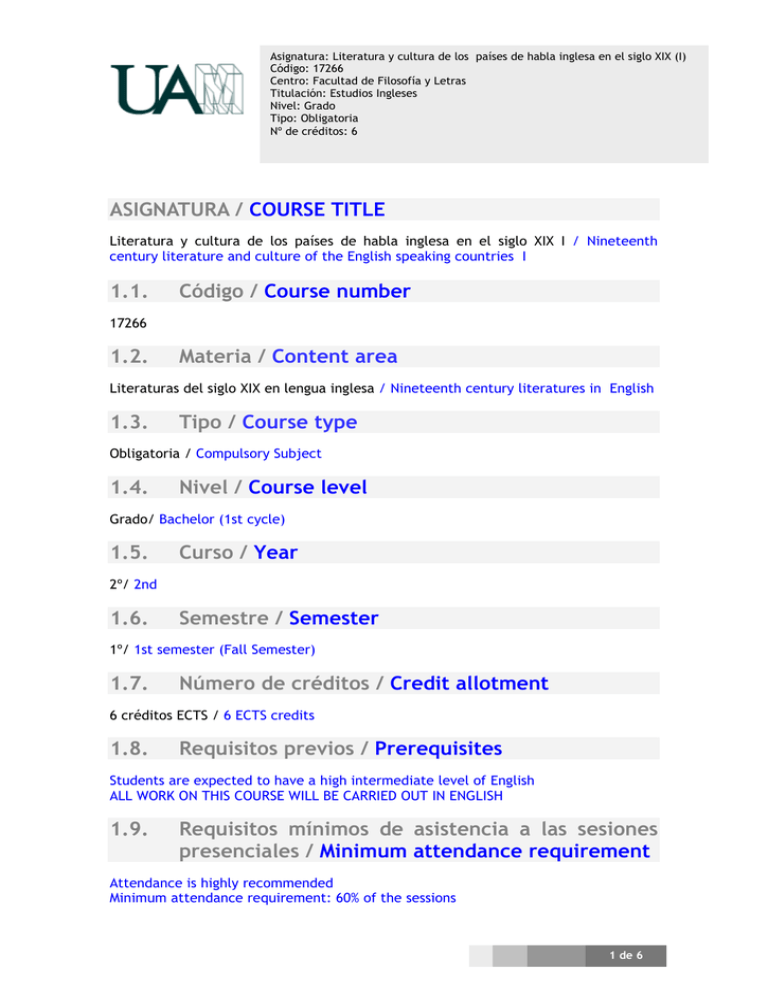
Asignatura: Literatura y cultura de los países de habla inglesa en el siglo XIX (I) Código: 17266 Centro: Facultad de Filosofía y Letras Titulación: Estudios Ingleses Nivel: Grado Tipo: Obligatoria Nº de créditos: 6 ASIGNATURA / COURSE TITLE Literatura y cultura de los países de habla inglesa en el siglo XIX I / Nineteenth century literature and culture of the English speaking countries I 1.1. Código / Course number 17266 1.2. Materia / Content area Literaturas del siglo XIX en lengua inglesa / Nineteenth century literatures in English 1.3. Tipo / Course type Obligatoria / Compulsory Subject 1.4. Nivel / Course level Grado/ Bachelor (1st cycle) 1.5. Curso / Year 2º/ 2nd 1.6. Semestre / Semester 1º/ 1st semester (Fall Semester) 1.7. Número de créditos / Credit allotment 6 créditos ECTS / 6 ECTS credits 1.8. Requisitos previos / Prerequisites Students are expected to have a high intermediate level of English ALL WORK ON THIS COURSE WILL BE CARRIED OUT IN ENGLISH 1.9. Requisitos mínimos de asistencia a las sesiones presenciales / Minimum attendance requirement Attendance is highly recommended Minimum attendance requirement: 60% of the sessions 1 de 6 Asignatura: Literatura y cultura de los países de habla inglesa en el siglo XIX (I) Código: 17266 Centro: Facultad de Filosofía y Letras Titulación: Estudios Ingleses Nivel: Grado Tipo: Obligatoria Nº de créditos: 6 1.10. Datos del equipo docente / Faculty data Luisa Antón-Pacheco Departamento de Filología Inglesa / Department of English Studies Despacho /Office: 305, módulo VI bis Facultad de Filosofía y Letras/ School of Arts Teléfono: 91 497 4247 E-mail: luisa.anton@uam.es Office hours: to be announced at the beginning of the course Julia Salmerón Departamento de Filología Inglesa / Department of English Studies Despacho/ Office: 201-VI bis Facultad de Filosofía y Letras / School of Arts Teléfono: 91 497 4086 E-mail: julia.salmerón@uam.es Office hours : to be announced at the beginning of the course 1.11. Objetivos del curso / Course objectives E7 Become aware of the complex nature of language and literature and their relation with other disciplines and fields of knowledge, as well as of the ways in which social and cultural contexts have an influence on the nature of language and meaning. E9 Know the most relevant characteristics of each literary movement, as well as the characteristics and evolution of each of the literary genres and subgenres, along with their historical and cultural context. E10 Understand how form generates content and to be aware of the role played by context, author and audience in the creation of literary texts. E12 To recognise and appropriately value the expressive and aesthetic resources of literary phenomena. E14 To be able to carry out literary and linguistic analysis of a variety of texts in English, using the appropriate terminology and tools, and within the theoretical frameworks studied. E17 To develop the ability to read attentively and to perfom text analyses through the understanding of historical and social contexts, and to develop awareness of the historical meaning of Literature. E20 To demonstrate an analytical/critical attitude towards Literature and the linguistic phenomena in English language, and to critically position oneself 2 de 6 Asignatura: Literatura y cultura de los países de habla inglesa en el siglo XIX (I) Código: 17266 Centro: Facultad de Filosofía y Letras Titulación: Estudios Ingleses Nivel: Grado Tipo: Obligatoria Nº de créditos: 6 regarding the different theories and the different approaches to a same problem. T4 To be able to work collaboratively in tasks of collective negotiation and to participate constructively in a debate T5 To reflect on one's own learning process and know how to evaluate it. T6 To plan one's own work and to manage time effectively. T7 To be aware of diversity and multiculturality Course objectives: This is a survey course on nineteenth century British literature. By the end of the course students should be able to write an essay on texts in the programme analysing their formal and stylistic features,identifying their innovatory aspects and thematic concerns,and situating them in their historical and cultural contexts. Objectives in terms of learning outcomes: I. To identify the formal and stylistic features of each text. II. To situate each work in its historical and cultural context. Objectives in terms of competences: I. To acquire the techniques used in literary criticism: to develop the ability to analyse the form and language of a literary text. II. To have the skills to write essays and prepare presentations on texts in the programme. 1.12. Contenidos del programa / Course contents 1) Poetry in the Romantic Period: Nature and novelty / Orientalism /The age of revolution/ Medievalism and the past / Narrative poetry / Versions of the poet. 2) Fiction in the Romantic period: The novel of manners and mores (Austen´s Pride and Prejudice) /The novel of ideas ( Mary Shelley´s Frankenstein) 3) Fiction in the Victorian age: Romance and realism / Serialisation /Didacticism / the Bildungsroman/ Status and class relations / Gender roles / Nationhood and empire / The sensational thriller and popular forms. 4) Victorian Poetry: Portraits of the artist / Gender roles and relations/ The dramatic monologue and other themes, issues and forms. 3 de 6 Asignatura: Literatura y cultura de los países de habla inglesa en el siglo XIX (I) Código: 17266 Centro: Facultad de Filosofía y Letras Titulación: Estudios Ingleses Nivel: Grado Tipo: Obligatoria Nº de créditos: 6 1.13. Referencias de consulta / Course bibliography At the beginning of the course the compulsory reading list will be handed out . This list will include a selection from the following authors and texts: • • • • • • • • • • • • • • • • • W. Blake, Songs of Innocence and Experience ( “The Chimney Sweeper¨ , “Infant Joy”, “Infant Sorrow”, “The Lamb”, “The Tyger”, “Holy Thursday” “London”) R. Burns “To a Mouse” W. Wordsworth, “We are Seven”, “Lines Composed a Few Miles Above Tintern Abbey”, extracts from the Prelude, “I Wandered Lonely as a Cloud”, “Composed upon Westminster Bridge” S.T. Coleridge, “The Rime of the Ancient Mariner”, “This Lime-Tree Bower My Prison”, “Frost at Midnight” “Kubla Khan”. J. Austen, Pride and Prejudice. Byron, Don Juan (Canto I) M. Shelley, Frankenstein. P.B. Shelley,“Ode to the West Wind”, “Ozymandias”, “England 1819” J. Keats, “Ode to a Nightingale”, “ The Eve of St Agnes” C. Brontë, Jane Eyre C. Dickens, Great Expectations Tennyson, “The Lady of Shalott” R. Browning, “My Last Duchess” R.L. Stevenson, The Strange Case of Dr Jekyll and Mr Hyde C. Rossetti, “ After Death”, “Song” T. Hardy, “The Darkling Thrush”, “Hap”, “Neutral Tones” E.B. Browning, “Sonnet 21” (Sonnets from the Portuguese) Bibliography: Curran, S. ed., The Cambridge Companion to British Romanticism, 1998. Eagleton, T., The English Novel , 2005 Kelly, G., English Fiction of the Romantic Period, 1989 Pirie, D.B. ed., The Penguin History of English Literature: The Romantic Period, 1995 Watson, J.R., English Poetry of the Romantic Period, 1985 Wu, D. ed., A Companion to Romanticism, 1998. Bratlinger, P. ed., A Companion to the Victorian Novel, 2002 Bristol, J., ed., The Cambridge Companion to Victorian Poetry, 2000 David, D. ed., The Cambridge Companion to the Victorian Novel, 2001 Cronin, R., et al., A Companion to Victorian Poetry, 2001 A supplementary bibliography will be provided at the beginning of the course Bibliografía, URL (direcciones de Internet), etc. 4 de 6 Asignatura: Literatura y cultura de los países de habla inglesa en el siglo XIX (I) Código: 17266 Centro: Facultad de Filosofía y Letras Titulación: Estudios Ingleses Nivel: Grado Tipo: Obligatoria Nº de créditos: 6 2. Métodos docentes / Teaching methodology Theoretical sessions: Lectures on the texts in the programme. Practical sessions: Written assignments on texts in the programme. Independent study time: Reading, preparation of oral and written assignments. 3. Tiempo de trabajo del estudiante / Student workload Nº de horas Clases teóricas Clases prácticas Tutorías programadas a lo largo del semestre Seminarios Presencial Otros (especificar añadiendo tantas filas como actividades se hayan incluido en la metodología docente) Realización del examen final Realización de actividades prácticas No Estudio semanal (equis tiempo x equis semanas) presencial Preparación del examen Carga total de horas de trabajo: 25 horas x 6 ECTS 4. Porcentaje 42 h 2h 3h 3h 40 h 30 h 30 h 150 h 33% (mínimo) = 50 horas 67% = 100 horas Métodos de evaluación y porcentaje en la calificación final / Evaluation procedures and weight of components in the final grade Convocatoria ordinaria: Final exam 60% Course work : written and oral assignments 40% Instructions about the written assignments, dates and deadlines will be provided by each lecturer at the beginning of the course. The instructions given by each lecturer will be implemented during the course. 5 de 6 Asignatura: Literatura y cultura de los países de habla inglesa en el siglo XIX (I) Código: 17266 Centro: Facultad de Filosofía y Letras Titulación: Estudios Ingleses Nivel: Grado Tipo: Obligatoria Nº de créditos: 6 Convocatoria extraordinaria: Exam 60% The grades obtained for oral and written assignments during the course will account for 40% of the final grade. 5. Cronograma / Course calendar A more detailed calendar will be provided by the lecturer at the beginning of the course. Contenido Contents 1 2 3 4 5 6 7 8 9 10 11 12 13 14 15 16 Introduction to the course Module 1 Module 1 Module 1 Module 2 Module 2 Module 2 Module 2 Module 3 Module 3 Module 3 Module 4 Module 4 Module 4 Exam Exam Horas presenciales Contact hours 3 3 3 3 3 3 3 3 3 3 3 3 3 3 3 3 Horas no presenciales Independent study time 6 7 7 6 7 7 7 6 7 7 6 7 7 7 6 NOTA: Las horas de tutorías programadas (2h) serán anunciadas al principio del semestre 6 de 6
